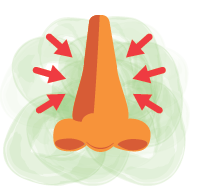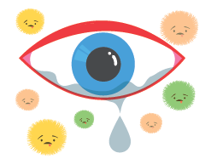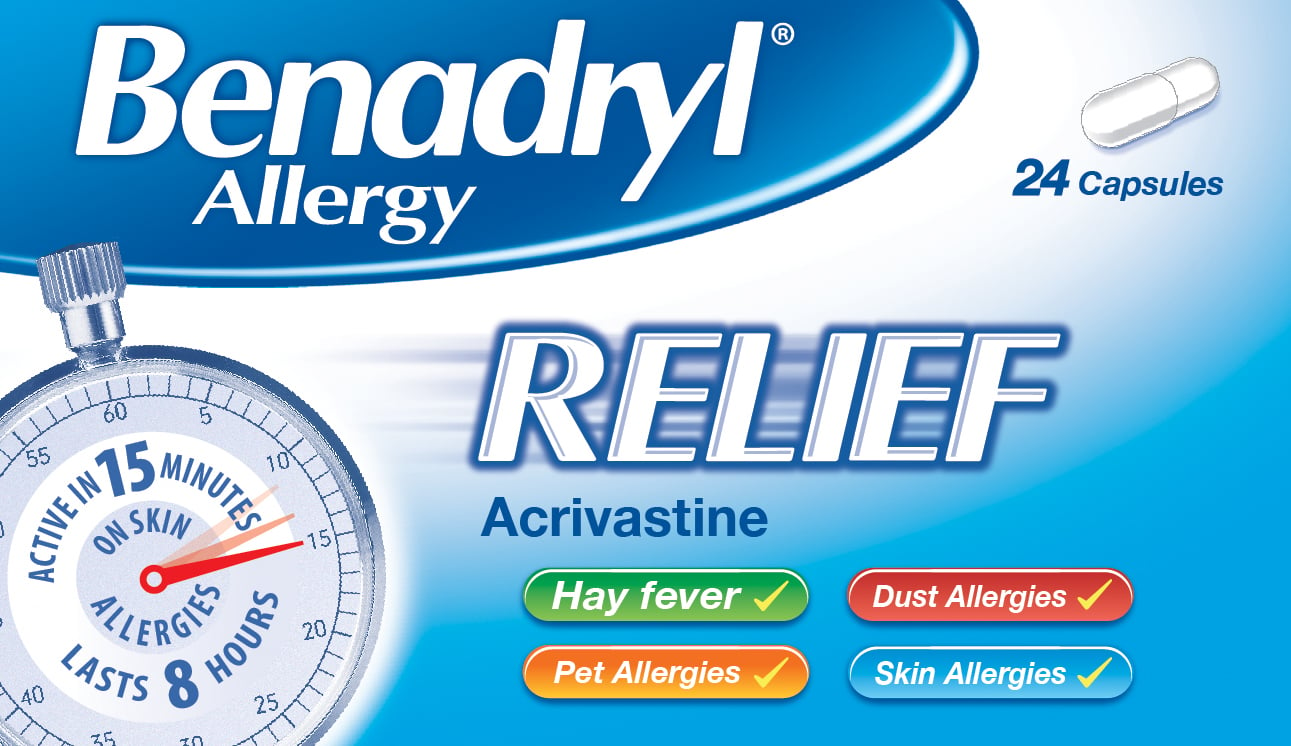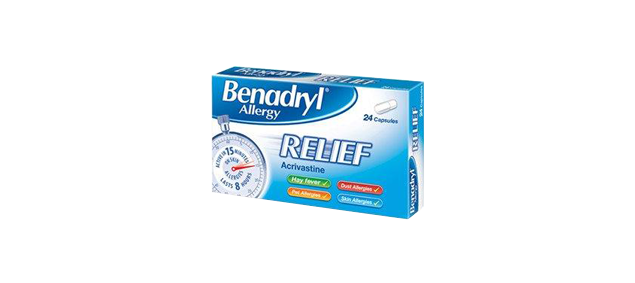Rhinitis: Symptoms, Causes & Treatment
There are two types of rhinitis – allergic and non-allergic. While each condition presents with similar cold-like symptoms, they have different causes. However, the good news is that both types of rhinitis are typically easy to treat with medication, either over-the-counter (OTC) or prescribed by a GP1.
Here, we will guide you through the symptoms, causes and treatments available for both types of rhinitis.
On this page:

What is rhinitis?
Rhinitis is an inflammation of the mucous membrane of the nose, causing cold-like symptoms, such as runny nose, sneezing and sniffling, watery eyes, and sometimes even an itchy throat.
In allergic rhinitis, inflammation is caused by an allergic reaction to a substance like pollen. In non-allergic rhinitis, the response may be caused by a variety of other factors, including hormone changes, environmental factors, or a viral infection such as a cold.
Rhinitis is a common condition, with allergic rhinitis affecting approximately one in every five people in the UK2. Some people may experience rhinitis year-round, while others may only have symptoms seasonally due to allergens such as grass or tree pollen in the air.2
What are the causes of rhinitis?
Different triggers cause allergic and non-allergic rhinitis1. Identifying which type of rhinitis you have and what the triggers are can help you to avoid them and reduce the symptoms of your condition2.
Allergic rhinitis causes
Either seasonal or perennial airborne allergens cause allergic rhinitis. Seasonal allergens include pollen, while perennial allergens include year-round substances, like animal dander or dust. When a person with allergic rhinitis breathes in an allergen, their body releases a chemical called histamine, which causes allergy symptoms.

Common allergens that can cause allergic rhinitis include 4:
Particles of skin, saliva, or urine from certain animals2
Mould
Latex
Flour dust
Wood dust
Other conditions that can make you more susceptible to allergic rhinitis include asthma and eczema4, a family history of allergies (atopy), or an oversensitive immune system5. Exposure to external factors such as dust mites or tobacco smoke at an early age can also make someone more likely to develop allergies5.
Non-allergic rhinitis causes
The specific causes of non-allergic rhinitis can be hard to identify6. This condition is most often diagnosed once other conditions, such as infection or allergic rhinitis, have been ruled out6.
Non-allergic rhinitis can be triggered by3:
Environmental or occupational irritants
Weather changes
Infections
Foods and beverages, such as spicy food and alcohol
Certain odours or irritants in the air, such as paint fumes or perfumes
Hormonal changes, such as those in puberty or pregnancy, or from taking oral contraception or HRT medications
Tobacco smoke
Frequent use of decongestant nasal sprays
Certain medications, including aspirin, beta blockers, angiotensin-converting enzyme (ACE) inhibitors and anti-inflammatories
Exercise
Conditions such as an underactive thyroid.
What are the rhinitis symptoms?

The main symptoms of allergic and non-allergic rhinitis are often like cold symptoms. However, there are specific symptoms you are more likely to experience, depending on which type of rhinitis you have.
Allergic rhinitis symptoms
Allergic rhinitis usually provokes symptoms within just minutes of coming into contact with the triggering allergen4. This can cause4:
Congestion: including sneezing, a stuffy or runny nose, or cough
Irritation: itchy, watery, red, swollen, or puffy eyes
Itchiness in the back of the throat and the roof of the mouth.
The duration of a bout of allergic rhinitis can vary, depending on the specific allergen that triggers it2. Seasonal allergies, such as pollen, will only cause symptoms for a few months of the year2. However, other allergens can cause symptoms year-round if you come into contact with them regularly2, such as with pet dander or household dust. Most people will find their symptoms are easily manageable through medication or by avoiding allergens3 4.They can also improve over time for some people, although they will very rarely disappear completely2.
Non-allergic rhinitis symptoms
The symptoms of non-allergic rhinitis are like those of allergic rhinitis, although the condition does not involve the immune system6. Non-allergic rhinitis typically only develops in adults and symptoms can last all year round6.
Non-allergic rhinitis symptoms may include3:
Congestion: including a stuffy, blocked or running nose, and sneezing
An itchy sensation in the nose
Reduced sense of smell.
Postnasal drip6
A crust forming on the inside of the nose.
What are my rhinitis treatment options?
While the underlying causes of allergic and non-allergic rhinitis are different, both types can be treated with medication from the pharmacy or prescribed by a GP3, 4. Medications will not cure rhinitis, but they can reduce the severity of symptoms to a manageable level7.

How to treat non-allergic rhinitis?
Recommendations to treat non-allergic rhinitis include identifying and avoiding your triggers and seeing a doctor for suitable treatment. A healthcare professional can help you to discover what’s causing your symptoms and advise you on treatment.
How to treat allergic rhinitis
It’s estimated that allergic rhinitis affects about one in every five people in the UK. There is a range of rhinitis medication available that can help to relieve your symptoms.
How do antihistamines treat allergic rhinitis?
Most people with allergic rhinitis can manage their condition using over-the-counter medications without needing to see their GP4. If you can identify your trigger, you can also take steps to avoid or limit your exposure to the specific allergen that is causing symptoms7.
Antihistamines7 are one of the most common medications to treat allergic rhinitis. When you have an allergic reaction, your body releases histamine into your bloodstream. Histamine causes symptoms like sneezing, runny nose, and itchy eyes. Antihistamines work by preventing the actions of histamine. There are lots of effective antihistamines on the market, so you can choose the type that works best for you.
Another home remedy that may be effective is regularly cleaning the nasal passageways with a saltwater solution7. This can help remove irritants and soothe any inflammation7.
You can buy small syringes and specifically designed pots to help you do this. You can also purchase ready-made sachets of solution from your pharmacist, or you can make your own by boiling a pint of water and allowing it to cool, then mixing in half a teaspoon of bicarbonate of soda and half a teaspoon of salt. Pour or syringe some solution into the nasal passage and sniff – repeat this one nostril at a time until you start to feel more comfortable7.

Benadryl Products for Allergy Relief:
Benadryl Allergy Relief: a fast-acting allergy relief option, Benadryl Allergy Relief capsules contain acrivastine, which starts to work in 15 minutes

Benadryl One a Day 10mg Tablets: contains cetirizine and provides long-lasting, all-day relief from your allergy symptoms. It effectively relieves hay fever, dust, pet allergies, and skin allergies
Non-allergic rhinitis treatment
Treatment advice for non-allergic rhinitis is mostly the same as for allergic rhinitis. Avoiding triggers, taking antihistamines, and cleaning the nasal passageways are often the most effective treatments3.
You may also want to avoid potential irritants, such as household sprays, perfumes and other harsh chemicals, tobacco smoke and anything else you believe triggers your symptoms6. Ask friends and family to avoid using these products around you too6.
When to see a doctor
It’s relatively rare to need to see a GP to help treat either type of rhinitis3 4. However, if your symptoms are severe and begin to have a noticeable impact on your daily life, such as affecting your sleep or ability to learn or work, you may want to seek further help2. You may also want further advice gadvice from a GP if over-the-counter remedies from the pharmacist and self-help measures are not relieving your symptoms2.
Your GP may change the medication you are taking or prescribe something similar but with a stronger dosage than that which is available from the pharmacist3. In some cases, they may also refer you for further tests, particularly if your symptoms are severe or it isn’t clear what is causing your condition3.
How to prevent allergic rhinitis
You can alleviate the symptoms of allergic rhinitis by identifying the triggering allergen and avoiding it as much as possible8.
You can also take various measures at home to reduce your risk of encountering potential allergens.These include4:
Vacuuming regularly with a HEPA-filtered2 vacuum cleaner. A HEPA is a High Efficiency Particulate Air filter that traps particles such as pollen, pet dander, and dust mites9.
Keeping your house as free from dust as possible by using a damp cloth to dust.
Bathing pets at least every other week and regularly grooming them outside.
Washing pet bedding and toys regularly.
Keeping pets clean and not allowing them into the bedrooms or on the furniture.
Using hypoallergenic bedding and washing it at 60C or higher.
Keeping a well-ventilated home by regularly opening windows.
Dealing with any condensation or damp within the home.
Staying indoors when the pollen count is high.
Wearing wraparound sunglasses when the pollen count is high to reduce irritation in your eyes.
1- https://www.benadryl.co.uk/allergy-types/rhinitis(Page 1-2)
2- https://www.nhsinform.scot/illnesses-and-conditions/ears-nose-and-throat/allergic-rhinitis(Page-1)
2- https://www.nhsinform.scot/illnesses-and-conditions/ears-nose-and-throat/allergic-rhinitis(Page2)
3- https://www.benadryl.co.uk/allergy-types/rhinitis(Page 1)
3- https://www.benadryl.co.uk/allergy-types/rhinitis(Page 2)
4- https://www.nhs.uk/conditions/allergic-rhinitis/(Page 1)
4- https://www.nhs.uk/conditions/allergic-rhinitis/(Page 2)
4- https://www.nhs.uk/conditions/allergic-rhinitis/(Page 3-4)
6- https://www.webmd.com/allergies/nonallergic-rhinitis(Page 1)
6- https://www.webmd.com/allergies/nonallergic-rhinitis(Page 1-2)
6- https://www.webmd.com/allergies/nonallergic-rhinitis(Page 4)
9- https://www.webmd.com/allergies/hepa-filters-for-allergies

Think all treatments are the same?
Explore different active ingredients that help relieve allergy. And find out which one is right for you.

Want allergy relief?
Take the quiz to find the right product to help treat your allergy symptoms.
